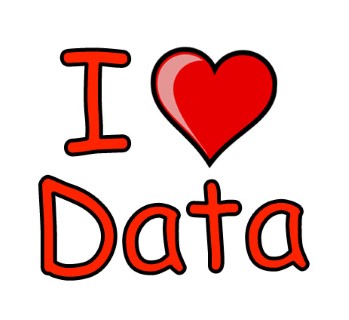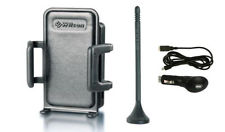Ways to conserve data is a pretty big deal for fulltimers that rely on cellular data as their sole source of Internet connection.
Many folks think they can live or spend extended time in their RV and have all the comforts of home.
Sorry, it just isn’t so….
Technology is moving fast. It is possible that an unlimited, high-speed data connection will be available anywhere, anytime in the near future but it isn’t here yet.
 Sorry to be the bearer of bad news.
Sorry to be the bearer of bad news.
On a positive note, what is available today would have been inconceivable twenty years ago and hard to imagine ten years ago. In fact, I was looking at a magazine at a “period” restaurant the other day that was from 1993. There was not a single URL or email address to be found in it! So, apparently, we did not even know that we needed a cellular data connection never mind that we needed to conserve data twenty-two years ago!
Internet data is one of those comforts that you simply will not have. Your motorhome is NOT connected to cable or DSL Internet source with an unlimited capacity of high-speed data when living abroad. Yes, there are a few campgrounds that have a good Wi-Fi connection waiting for you. However; that same wifi quickly becomes unusable when twenty people pull in and all start streaming Netflix movies. Please don’t do that, it ruins it for everyone.
Since a lot of people do it anyway – either because it is all about me-me-me or they won’t take a minute to think about it – most campground Wi-Fi is not great. Ignorance is no excuse.
The only reasonably dependable and affordable source of Internet data is a cellular connection (a smart phone setup as a hotspot (or tethered) or mifi (hot spot)). The limitation here is that nearly all of us are paying a certain amount each month for a limited amount of data – it ain’t free. Just like most things in life, you have to learn to be smart with the resources you have and/or can afford. This can be done with your computer and cellular data plan but it requires you to conserve data. Here are a few pointers:
- Turn off automatic updates. You really need to keep up on updates (critical updates, services packs, anti-virus updates, etc…) but doing so via cellular data is not the way to do it. There are many locations to learn how to do this, Google it for details.
- Set your email client to download headers only. Friends and family that are not operating with limited bandwidth seem to love to send email with 10 Mb photos attached. That’s ok but, via cellular connection, you don’t have the bandwidth that all of them have. The header information will show you the sender, subject, and the size of the message. You can then choose which messages to delete without even reading, which to download now and which to save to download once connected to Wi-Fi or a land line.
- Remove embedded photos from email replies. Sending a “Great photo!” email response that is 10 Mb in size is just silly (and just as silly as the same response consuming 200 k of data).
- Stop browsing “heavy” content sites when on cellular data. This generally includes any website that is heavy on photographs.
- Stop streaming TV shows and movies! At this point in time, this just isn’t possible – eliminate the expectation from your brain. If over the air channels are insufficient, fork out the money for a satellite connection and/or a DVD collection if you must have TV when on the road. Yes, it is one of the cons of RV living.
- Sometimes you just have to send a photo. Resize it first. There are many utilities available for doing this. Sending a 10 Mb, high resolution photo to someone for them to glance at it, chuckle, and delete is just a waste. Most photos can be reduced to 800×600 and 200 kilobytes or less and are still just as good as the original for this purpose.
- Stop forwarding junk. Lots of good info is communicated via email. If you are one that forwards every message you receive, stop it. Most people could care less about this junk email and immediately delete it. All you are doing is wasting the bandwidth for which you are paying dearly.
- Install an ad blocker for your browser. I’m not sure that ad’s make up a huge amount of data transfer but it can’t help. Remember that some sites exist because of the tiny bit of ad revenue they receive.
- Check you cellular plan usage often to be careful of overages. Also, check it on the last day of your billing cycle. If a bunch is remaining (and you don’t have a data rollover plan), get as many of the big item downloads done on that data as the available data will allow.
- If you have a more modern computer operating system, set your mifi connection to metered. This tells the OS not to treat the Internet connection like it is unlimited (don’t download updates, services packs, and such without your permission).
- Eliminate “tiles” from your desktop. Many of these (like weather or stock market tiles) use a huge amount of data – often for very little gain.
Please do not ask me for the details on HOW to accomplish some of the above. There are hundreds of variations – operating system, software, utilities, etc… and I make every effort NOT to know the details of all of them. As an owner and user, it is your job to educate yourself. The Internet is full of resources, check your manual, read the online help for your utility. Just like you would not install a new transmission in your car without doing a little research, don’t install something on your computer without a similar process. There is lots of junk out there (both utilities and advice) but also plenty of good stuff – it is YOUR job to figure out the difference.
It is probably worth noting satellite Internet service since someone will mention it. At this point in time, a mobile satellite based system is not what I call “affordable” as the dollar per megabyte is very high. These systems are available primarily for the marine environment (it seems). The land based, residential, satellite internet providers are getting closer and closer all the time (such as Hughes Gen4). It is hard to uncover the important details of these services and I am no expert. From what I understand, professional installation is required so use in an RV is not workable. They also seem to be very hush-hush about data limits.
Ok, you’ve done all of these things to conserve data but are a full-timer, how do you get the “big item downloads” that are needed (updates, big emails that you want to see, etc…)? There are several places that offer free Wi-Fi and these places are your friend. McDonalds, Starbucks, some travel plaza’s, etc… Pay attention to where free Wi-Fi exists and do you big downloads at these locations. Most of them are not super-fast but they are free!
With a little effort, you can most certainly conserve data and probably money, as a result, by educating yourself and following these suggestions.



Good write up about how to control internet data. I have had to learn how to since moving to satellite internet service in June 2014. I had no other internet provider choices based on where my house is located. I pay too much for 15Gb per month. I found out really quick just what I couldn’t do and would have to cut back on.
At least I get a period of free data every night from midnight to 5am. I’m a night person so I am usually up past midnight and can update my computer, iPhone and iPad when Apple has their large OS updates.
Again, thanks for the great blog post on conserving data, very helpful.
Good advice and very well written. Thank you.